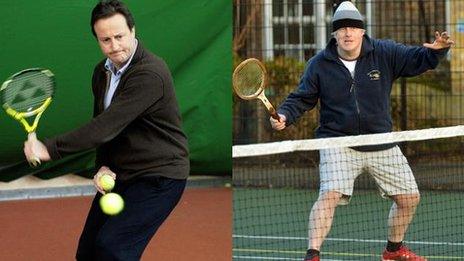Johnson: £160k tennis match did take place
- Published
Mrs Lubov Chernukhin is married to Vladimir Chernukhin, who was Putin's deputy finance minister in 2000.
Boris Johnson has defended a £160,000 donation made to the Conservatives by a former Russian minister's wife in return for a tennis match with him.
Confirming the 2014 match, which was also set to include David Cameron, took place, he warned against creating a "miasma of suspicion" against Russians.
"To the best of my knowledge, all possible checks have been made and... will continue to be made" on donations.
Lubov Chernukhin had bid at a fundraising auction at a Tory event.
Mr Johnson was mayor of London in 2014. The match was reported at the time - Mrs Chernukhin is a longstanding Conservative Party donor whose husband served under Vladimir Putin.
The tennis match against Mr Johnson and the then prime minister Mr Cameron was among items auctioned off at the Conservative Party summer ball in the summer of 2014.
Law firm Carter Ruck confirmed at the time that the successful bidder was Mrs Chernukhin, whose husband Vladimir was deputy finance minister under Mr Putin between 2000 and 2002.
Asked about it on BBC One's Andrew Marr Show, Mr Johnson said: "If there is evidence of gross corruption in the way that gentleman in question obtained his wealth... then it's possible for our law enforcement agencies to deprive him of his wealth with an unexplained wealth order - that is a matter for the authorities, it's not a matter for me."
'Quite extraordinary'
He stressed that "we have no quarrel with the Russian people" and warned against suspecting "the entire nation" where no evidence was produced against individuals.
Asked if the tennis match had taken place, he replied: "It did."
But he added: "It's very important that we do not allow a miasma of suspicion about all Russians in London - and indeed all rich Russians in London - to be created."
And he said it was "quite extraordinary" while those who had been attacked were critically ill, for the "fire to be somehow turned on Conservative Party funding".
"To the best of my knowledge, all possible checks have been made and they will continue to be made."

Analysis
By Jonathan Blake, BBC political correspondent
It was undoubtedly an awkward moment.
The foreign secretary had to admit that he played tennis with the wife of a former Russian government minister, in return for a hefty donation to the Conservative Party.
Albeit four years ago, and albeit in accordance with the Electoral Commission rules.
Now though, it allows Labour and other critics to question the credibility of a Conservative government taking such a tough line against Russia.
But there has been no great clamour to criticise, beyond raised eyebrows and pointed fingers.
Perhaps Mr Johnson's opponents think it is better to let the facts speak for themselves, than be accused of political point scoring at a very sensitive time.
All parties need money after all, and all need to be careful where it comes from.

Retired military intelligence officer Sergei Skripal, 66, and Yulia, 33, remain critically ill in hospital after being found slumped on a bench in Salisbury city centre on 4 March.
The Russian government has denied any involvement, but the UK and its allies say there is "no plausible alternative explanation" to Russia being behind it.
Shadow Cabinet Office minister Jon Trickett said the Conservatives had "serious questions to answer about where their party gets its money".
He said Mr Johnson had "confirmed for the first time" that he had played in the tennis match, adding: "He admitted that some Russian oligarchs in the UK 'may have obtained their money by corruption'."
"The Conservative Party can't remain silent any longer, the public have a right to know what checks if any they made to establish the source of all the wealth amassed by their donors."
Shadow Chancellor John McDonnell has called for the introduction of an "oligarch levy" as part of efforts to strengthen financial sanctions on Russia.
It would introduce a charge on purchases of residential property by offshore trusts in tax havens and, the party says, could raise £875m a year.
Mr Johnson said the government was already "pursuing a number of measures" but would be "intensifying" sanctions on individuals who had obtained "wealth by corruption" and were linked to the Kremlin.
- Published4 July 2014
